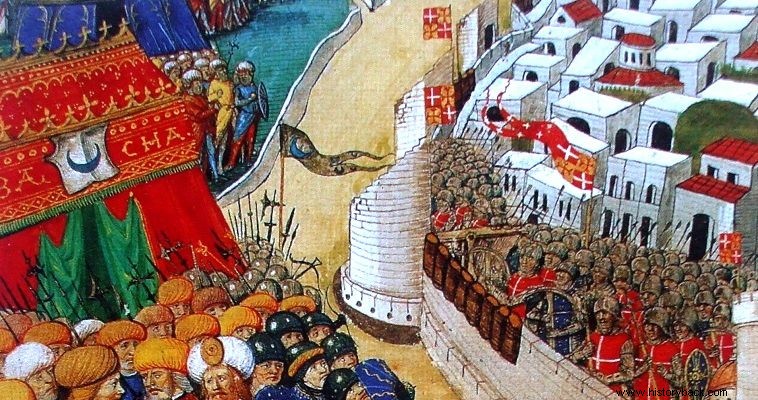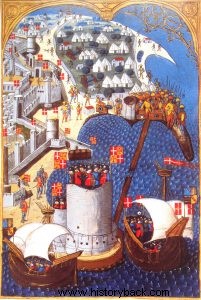
In 1480, Mohammed II the Conqueror seemed to be absolute sovereign in the Eastern Mediterranean. He had crushed the Venetians and conquered Chalkida. At that time, the Order of the Knights of Agios Ioannis was based in the Dodecanese. The Order had formed in the Holy Land and had written its own history there. Then he acted in Cyprus, but also in mainland Greece, against the Ottomans (early 15th century).
Finally theknights they had conquered the Dodecanese creating a small naval state that always continued the war against the Muslims. Mohammed had first attacked the knights in 1454. A new attack was made in 1467 without success. After his victory against the Venetians, however, Muhammad seemed determined to clear out the Rhodian "wasp's nest", citing the help that the knights offered to the Venetians. during their fight against the Turks.
Muhammad was also influenced by three "Greeks", the grand vizier Mezih Palaiologos, Demetrius Sofianos from Chalkida and Antonios Meligalos from Rhodes. Already in 1478 the sultan was convinced and began the preparations.
The Turks are arriving
On December 4, 1479, a Turkish squadron attacked Rhodes but was repulsed. The Turkish attack against Tilos had the same fate. Thereafter the Turkish squadron withdrew awaiting the arrival of the bulk of the Turkish fleet. At the end of April 1480, 60 Turkish ships sailed from the city and joined the nearby Rhodes squadron. The united Turkish fleet appeared on May 23, 1480 outside the port of Rhodes.
The head of the expedition was Mezih Palaiologos accompanied by Sofianos and Meligalos. But Sofianos died during the journey de Meligalos was killed immediately after landing on the island in a skirmish with a detachment of knights under Viscount Model.
In the meantime the grand master Pierre d'Aubuchon, having information, had prepared as best he could, gathering as many knights as he could, together with mercenary soldiers and Rhodian militia. In total the grand master could marshal about 7,000 men, of which 5,000 were Greeks. The sources do not agree on the strength of the Turkish army and state that it numbered 70-100,000 men. The Turks also had 100-160 ships. D'Aubuchon had also asked for help from the West but no one was interested.
Descent and first battles
The Turks landed west of the city of Rhodes on the hill of Agios Stefanos, today's Monte Smith. There was a fortress of the knights that was conquered after a fierce battle. The Turks prevailed and two days later created an artillery position on the top where they fired three heavy bombs and began to bombard the tower of Agios Nikolaos, a key point that controlled the city's port.
Several days of cannonade followed, with the result that the tower was largely demolished. On June 9 Mezih Pasha unleashed the janissaries against the tower. But the knights were waiting for them with swords in hand with the brave wizard first. A fireball hit d'Oubuchon's helmet, but he laughingly refused to retreat saying:"To the grand master belongs the place of honor".
Being flanked by the city walls and receiving the savage counterattack of the knights, the janissaries broke and fled, while many fell into the sea and perished. After this defeat Mezih turned his attention against the walls of the city and especially towards the point of the Jewish quarter.
D'Aubuchon, however, ordered the construction of a second wall, inside, so that even if a breach were created, the Turks would be in front of a second line of defense. Men women, old and young, worked intensively and the wall was raised.
So Mezih changed his plan again and decided to launch a new attack against the half-destroyed tower of Ag. Nikolaou from the sea, but also from the land, constructing a floating bridge, so that the attacking units would be out of range of the crossbows and firearms of the city guard.
New attacks and incendiary weapons
The attack was launched at midnight on June 19 and lasted without pause or mercy until 10.00 the next morning when 2,5000 Turkish corpses proved the superiority and fanaticism of the defenders. Enraged by the new bloody failure, Mezih ordered his artillery to pound the city walls wildly. And indeed the Turkish artillery fired over 3,500 projectiles causing large cracks in the walls.
In response the defenders built a huge volley machine, hitting the Turkish artillery. In the meantime, d'Hubusson, expecting a general attack by the enemy, ordered sulphur, asphalt and other inflammable materials to be gathered on the walls. At the same time, the defenders created primitive improvised explosive devices, placing gunpowder and pieces of metal in sacks, but also primitive hand grenades, made of paper, with gunpowder and metal fragments.
Mezih was indeed preparing a general attack. But before unleashing it, he demanded the surrender of the city with a treaty. D'Aubusson rejected the proposal, telling some knights who favored it that they were free to leave. “But if you stay and talk about capitulation again I will kill you all”, he told them.
General attack
The Turks launched their big attack on July 28, after several days of heavy bombardment of the walls and after they had prepared 8,000 palukis to repulse the defenders! Mezih had promised his hordes that they could sack the city. With the cry of "Allah" the Turks rushed out. Of these 3,000 elite attacked the main breach that had been created in the wall. Another 40,000 Turks attacked elsewhere.
In the face of this terrifying human mass the defenders lost ground and the flag of Mezih was raised on one of the bastions. According to some sources Mezih declared to his men, at that moment, that they would not be allowed to loot and that the declaration halted the momentum of his men. However, this information is controlled.
First, was it possible in the heat of the battle and the panic for Mezih to inform with his thousands of men? Second, was Mezih so foolish as to make the declaration at this moment when he had the city in his hands and be denied victory? Probably not.
In any case d'Aubusson at that moment launched a fierce counter-attack at the head of his bravest knights and swept the Turks. Seeing his men retreating, Mezih began slaughtering the retreating men while also ordering 12 elite janissaries to kill the grand wizard. But all 12 were mercilessly slaughtered. D'Aubuchon, having five wounds on his body, continued to fight like a lion.
“Let us rather die here brothers than retreat. Can we die more gloriously than defending our honor and our order?” he shouted to his men. With renewed courage the knights rushed with bare swords against the single Turkish mass, slaughtering those they could catch, pursuing the enemies to their camp.
This defeat crushed the morale of the Turks. Having suffered losses of 24,000 men to no avail, Mezih ordered a retreat. The fleeing Turks attacked the knights' fortress at Halicarnassus (St. Peter's fortress), but were again defeated and humiliated and moved away.

